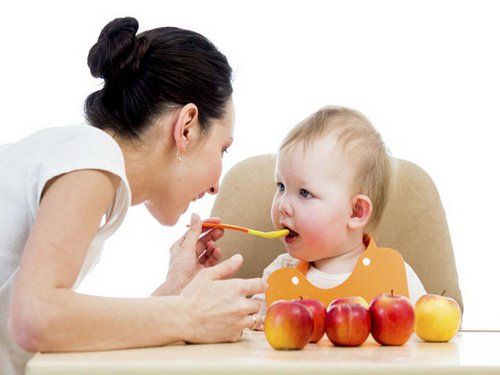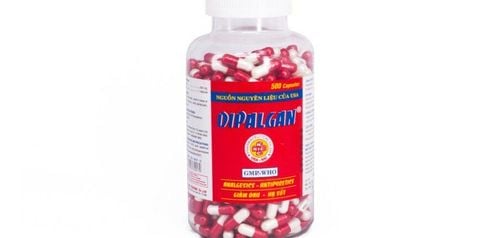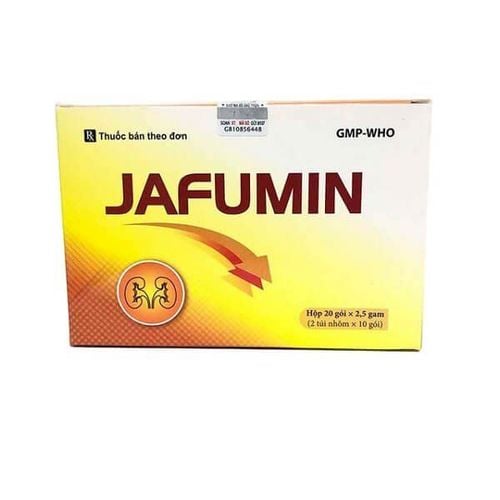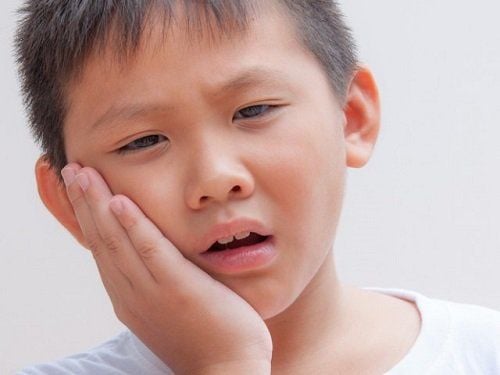This is an automatically translated article.
From the age of 6 months onwards, children will begin to enter the period of teething, which makes them fussy and anorexic. Therefore, you need to grasp the psychology as well as take care of children skillfully to avoid anorexia teething that leads to weight loss, malnutrition, and poor health.
1. The stages of teething children are anorexic
Knowing the teething periods of children will help you prepare psychologically and have the best nutritional solutions to minimize anorexia in children.
Usually, babies will start to grow their first teeth when they are 6 months old with symptoms of discomfort, anorexia (although before that, children eat very seriously and fully). The period when children grow 2 teeth will take about 4 to 8 months. Then there is the period of 6 - 8 teeth that lasts from 9 to 13 months.
Therefore, you need to grasp Psychologically as well as taking care of children skillfully to avoid anorexia teething, which leads to weight loss, malnutrition, and poor health.
2. Signs of anorexia teething children
Every child has different teething symptoms. Usually, when you see a child suddenly anorexia accompanied by drooling, swollen gums, biting fingers, fussiness and irritability, you need to think of the growing baby teeth.
Teething is the cause of pain in the mouth, making children not want to eat. In addition, some children may experience diarrhea when teething, irritability, and decreased appetite. If there is no timely remedy, this will lead to prolonged anorexia, affecting the health and development of children.
These symptoms usually appear 3-4 days before the teeth erupt, take place during the teething phase, and don't disappear until 3 days after the teeth have fully erupted. To minimize symptoms as well as avoid anorexia teething, you need to establish a reasonable nutritional regimen that helps children accept food easily.

Để tránh tình trạng trẻ mọc răng biếng ăn mẹ cần thiết lập chế độ dinh dưỡng hợp lý cho trẻ
3. Baby teething stop eating what to do?
When the baby teething, anorexia leads to weight loss, parents are always worried and wonder "what to eat to make the child gain weight again". Here are some ways to help your baby eat better while teething.
3.1. Incisor teething stage (6-10 months) When the first incisors begin to grow, children will have to suffer from pain in the gum area. During the period of eruption of 4 incisors, children often put their fingers or soft objects or anything within reach into their mouths to bite. The feeling of itching and pain in the gums plus fatigue are the main causes of anorexia when teething.
However, do not worry too much because at this stage, the main food for babies is milk, which is still the main source of nutrition for children under 1 year old. Therefore, if the child is not interested in porridge, you should increase the amount of milk per day for the child. In addition, you also need to strengthen the nutritious snacks for children such as mashed potatoes, pudding... to stimulate children to eat delicious and full of nutrients.
3.2. The canine teething stage (10-16 months) When a child is a little older, the child has begun to have a sense of teething, so he will cry more, especially when suffering from pain and itching of the gums. Some children may also have a low-grade fever and loose stools, putting them at risk of dehydration.
To help children become more interested in eating during the period of canine teething, you should divide the meals during the day, each time only give them a moderate amount to help them not get bored. Avoid giving your child too much food at a time as it can cause vomiting.
Raw, hard foods should be removed from the child's menu these days, instead of easy-to-swallow foods such as soup, porridge, soup... cooked from soft foods (such as minced meat, eggs). , tofu, pumpkin, potato, carrot puree...). Do not forget to rehydrate your baby with milk or fresh fruit juices (for children over 1 year old).
When the gums are itchy and the child tends to chew on things, you can boil or steam the vegetables until they are soft and then give them to your child to eat. A few slices of banana or sliced avocado may also interest your baby.
3.3. Stage of molar teething (16-20 months) At this stage, uncomfortable symptoms from teething usually only cause anorexia in children. To overcome the situation of anorexia children when molars erupt, you should let them enjoy nutritious foods, and decorate the dishes so that they are attractive and beautiful.
You need to note that babies will still have discomfort before and during teething, so they may eat less than usual. Therefore, you need to consider reducing the child's portion size, dividing the meals during the day.
Some foods you should increase your child's intake during this period are calcium-rich foods (such as milk, eggs, seafood, tofu); foods rich in zinc and selenium (such as beef, dark chocolate, cereals...); fruits and vegetables. Avoid giving your child foods that are too hot or too cold because they are not good for the baby's teeth development.

Mẹ nên chia nhỏ các bữa ăn trong ngày nếu gặp tình trạng trẻ mọc răng biếng ăn
4. How to take care of an anorexic teething child?
In addition to nutrition, you should also pay attention to the daily care regimen so that the child always has a comfortable mind and the healthiest body during the teething period. The ways to take care of anorexia teething children are:
During this stage, children often feel uncomfortable and irritable, so you need to be patient, spend more time with your child, play and talk together so that the child forgets. go to toothache. When teething, children often have itchy gums. Therefore, you can gently massage the gums with your hands to help reduce the pain. You also need to pay attention to wash your hands thoroughly before massaging to avoid introducing bacteria into the baby's mouth. Instead of letting your child chew on toys when his gums are itchy, you should give him processed fruits. This tip is recommended by specialists, because it helps children reduce itchy gums and stimulates teeth to grow more easily. You need to pay attention to daily oral hygiene for children, especially after feeding and eating. The correct way to clean it is to use a finger wrapped with a gauze or soft towel, dip it in clean water and then gently wipe the child's oral cavity to avoid infection. Limit your baby's pacifier when sleeping, as this can create an opportunity for bacteria to attack the baby's oral cavity. Teething children often anorexia, eating less than usual. Therefore, you should not be too worried and force your child to eat by threatening or scolding, that will affect the child's psyche. These are simple ways to help you take care of your child with anorexia due to teething. This stage is one of the most important stages of a child's development, so you need to pay attention to let your child develop to the fullest extent. Besides, the baby also needs to add necessary micronutrients such as: Zinc, selenium, chromium, vitamins B1 and B6, ginger, acerola fruit extract (vitamin C), ... to improve taste, eat delicious, reach the correct height and weight and exceed the standard, have a good immune system, increase resistance to less minor illnesses as well as less digestive problems. Parents can simultaneously apply dietary supplements and functional foods derived from nature for easy absorption. The most important thing is that improving your baby's symptoms often takes a long time. Combining many types of functional foods at the same time or changing many types in a short time can make the baby's digestive system unable to adapt and completely not good. Therefore, parents must be really patient with their children and regularly visit the website vimec.com to update useful baby care information.













